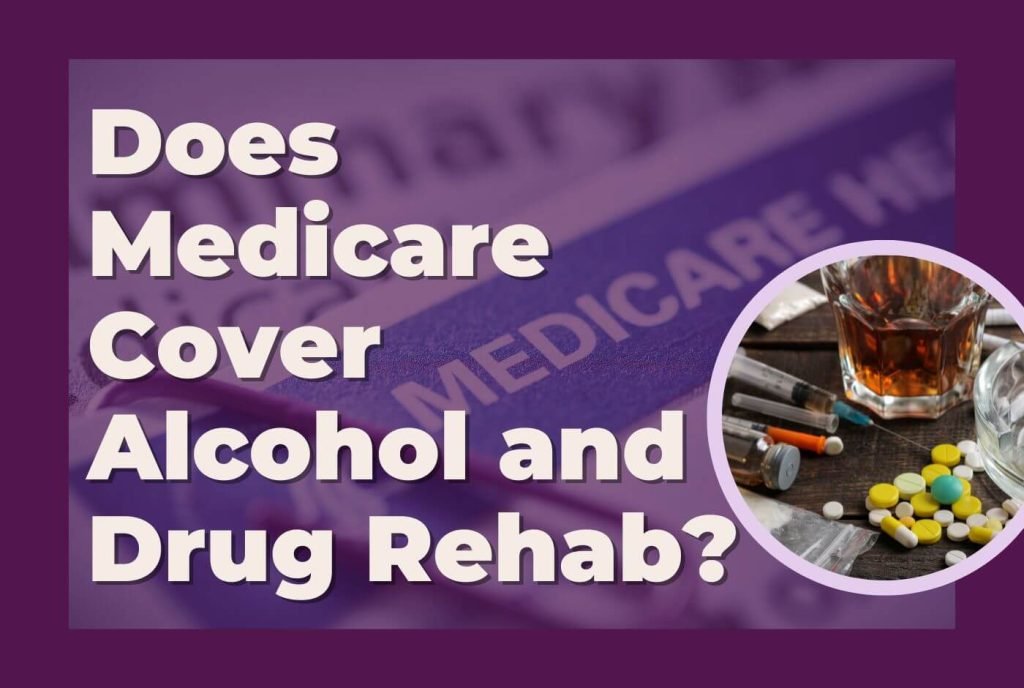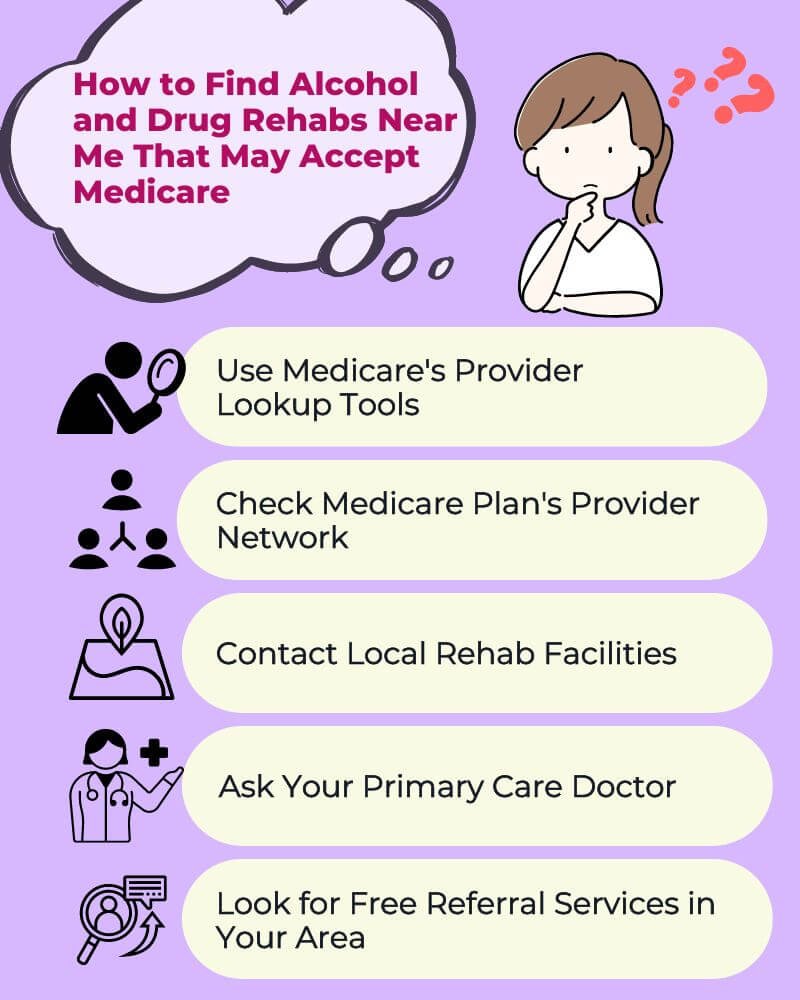Yes, Medicare covers alcohol and drug rehab. According to recent data, 15% of American citizens, or more than 44 million persons over 65, are enrolled in the Medicare program.
Addiction to drugs or alcohol is a long-term sickness because people who have it can’t stop using, even when it hurts them. Both addiction and withdrawal are caused by changes in how the brain works. Addiction can hurt your physical, mental, and social health, so you need professional help and support from others in your community to get better. Medicare covers inpatient and outpatient services, as well as counseling and therapy for alcohol and drug rehab. In addition to Medicare coverage, many states also offer Medicaid coverage for drug rehab for those who meet certain eligibility requirements. It is important to explore all available options for coverage to ensure you or your loved one can receive the necessary treatment for addiction.

Let’s delve into our blog to learn more details about medicare coverage for alcohol and drug rehab, how it works, the pros and cons, and so on!
What Alcohol and Drug Rehab Services and Treatments do Medicare Cover
Medicare covers alcohol and drug addiction therapy and other aftercare services. However, there are many options, and Medicare will only cover the appropriate treatment services. Inpatient and outpatient treatments must be provided, but there are also some other programs that Medicare covers.
Let’s look out for the treatments and services Medicare could possibly cover-
Inpatient treatment
Medicare covers drug and alcohol rehab you stay in so that you can get help for your drug or alcohol addiction. Inpatient medicare treatment usually covers detox, therapy, counseling etc. Medicare is important for recovering addicts, but the coverage varies according to the patient’s eligibility.
Outpatient treatment
Drug and alcohol addicts can receive vital outpatient alcohol and drug rehabilitation therapies through Medicare. Patients need not stay in, and the sessions are provided within a routine for a limited time. Counseling, therapy, medication management, and other treatments are available. Medicare helps people recover from addiction while living their regular lives.
Partial hospitalization
Partial hospitalization is defined as intensive mental therapy without hospitalization. Outpatient or community mental health clinic visits occur regularly on a weekly basis in these types of programming. The costs of diagnosis, individual and group therapy, and family therapy are covered by partial hospitalization, but transportation and food costs are not.
Intensive outpatient treatment
Medicare covers IOP (intensive outpatient treatment) for substance abuse problems. Group and one-on-one counseling are two forms of structured therapy and support available. Patients eligible for Medicare may receive reimbursement for these treatments while they are healing.
Substance abuse counseling
Medicare covers substance abuse counseling so addicts can get professional help to deal with and beat their addiction. These services usually include one-on-one or group therapy sessions that deal with the mental and emotional parts of drug use disorders.
Support from Medicare makes sure that each person has the tools they need to deal with their specific problems on their way to recovery.
Medication-assisted treatment
Medication-assisted treatment (MAT) is vital to addiction care, and Medicare pays for it. MAT combines therapy with FDA-approved medication that has been proven effective in treating addiction.
Federal statistics show that less than 16% of 1 million Medicare enrollees with opioid use disorder (OUD) received treatment in 2020. This underscores the vital role MAT plays in addressing the opioid crisis.
Alcohol misuse screenings
Medicare offers preventative tests for alcohol abuse to find and treat problems early on. These tests help healthcare professionals and people spot behavior that could be dangerous and take action. The fact that Medicare focuses on preventative treatment shows how important it is to stop people from abusing booze for their health.
Depression screenings
Medicare offers preventive depression testing to diagnose and treat depression early. These exams identify at-risk individuals to promote mental health and well-being. Medicare emphasizes mental health and supports people in need by integrating depression screenings and lowering untreated depression.
Behavioral health integration services
Behavioral Health Integration (BHI) services from Medicare assist primary and mental health providers in collaborating. This combination provides comprehensive physical and mental health treatment. BHI services improve mental health outcomes through coordination and patient-centered care.
Am I Eligible for Medicare?
There is a good chance that Medicare benefits will be available to you or a loved one if you:
- You are at least 65 years old.
- You are disabled and under the age of 65.
- You are under 65 and have end-stage renal illness (permanent kidney failure requiring dialysis or transplantation).
Each person seeking medical care is evaluated individually, and factors such as income and assets may be considered.
How much does Medicare pay for drug and alcohol rehab?
Medicare pays 80 percent of these rehab components’ Medicare-approved price. Licensed general practitioners, nurse practitioners, physician assistants, psychiatrists, clinical psychologists, clinical social workers, and clinical nurse specialists can provide services.
Medicare Part A
This Medicare benefit may cover inpatient care. Part A covers up to 60 days of rehab without co-insurance, although deductibles vary. The lifetime limit for Medicare-covered psychiatric inpatient care is 190 days. Only freestanding psychiatric facilities are subject to this requirement. Inpatient methadone treatment is covered.
Medicare Part B
It may cover outpatient expenses. The individual pays 20% of authorized treatment costs, while Medicare covers up to 80%. A supplemental healthcare plan may cover some of these costs. Part B may address co-occurring disorders like anxiety, depression, etc.
Part B covers substance use disorder therapy, patient education, follow-up care following inpatient treatment, and follow-up medicines.
Medicare Part D
Private insurers deal with Medicare to supply Part D. These plans cover prescriptions. Your Medicare Prescription Drug Plan coverage for alcohol addiction medicine depends on your plan. Plan coverage for alcohol addiction drugs varies greatly.
Several plans cover all FDA-approved alcohol addiction drugs, while others cover several. Check your plan for coverage.
How to Find Alcohol and Drug Rehabs Near Me That May Accept Medicare

Looking for a Medicare-accepting alcohol recovery program doesn’t have to be hard. Here are some steps to discover a Medicare-accepting program:
Use Medicare’s Provider Lookup Tools
Use Medicare’s official online tools and listings to find rehab centers near you that accept Medicare. This will give you accurate and up-to-date information.
Check Medicare Plan’s Provider Network
Check the service network information in your Medicare plan’s paperwork to find a list of rehab centers covered by your plan.
Contact Local Rehab Facilities
Get in touch with local rehabilitation facilities directly to find out if Medicare is accepted, what treatments they provide, and if they have any openings.
Ask Your Primary Care Doctor
Seek advice, direction, and referrals from your primary care physician for trustworthy rehabilitation facilities that accept Medicare.
Look for Free Referral Services in Your Area
Look into local contact services or non-profits that can help you get in touch with Medicare-approved rehab centers, which will make the search process easier.
Can Medicare Deny Alcohol Rehab or Treatment?
In some cases, Medicare may refuse to pay for alcohol treatment or rehabilitation. A common explanation is that Medicare does not cover the procedure since it is not considered medically necessary.
One of my cousins was under Medicare treatment and shared her experience with us. She said she had been denied the coverage as the medical center wasn’t a Medicare-approved provider; she didn’t know the fact previously.
Medicare coverage gaps also play a role in denial, as does the presence of a preexisting condition. In addition, Medicare coverage can be denied once you’ve used up all of your allotted benefits. If you want Medicare to pay for alcohol treatment or rehabilitation, you’ll need to study their policies and talk to medical experts.
People Also Asked
How Long Will Medicare Pay for Rehab?
Medicare does cover inpatient rehabilitation programs, but only up to a certain point. In general, Medicare covers up to 90 days during a benefit period. The benefit period can be extended for an extra 60 days if medically necessary. But it’s important to know that everyone’s situation is different and that coverage relies on medical exams and the specifics of the Medicare plan.
Does Medicare Cover Inpatient Alcohol Rehab?
Yes, Medicare covers inpatient alcohol rehab. Detoxification, counseling, therapy, and other treatments as medically indicated are common components of this process. Medicare plans vary, so it’s important to review the details of your plan and speak with healthcare providers for more information.
Does Medicare Cover Alcohol Detox?
Yes, Medicare will pay for alcohol detox if it is deemed medically necessary as part of the inpatient rehabilitation program. Medicare helps make sure patients get the treatment they need during detoxification, which is an important part of treating alcoholism.
Can I Have Dual Eligibility for Medicaid and Medicare?
Yes, you can have dual eligibility for both Medicaid and Medicare. Most dual-eligible people can participate in both programs because of their low income or disability. As a supplement to Medicare, Medicaid pays for medical expenses that the federal program may not.
Alcohol and drug-addicted patients who qualify for Medicare have many coverage options. Elderly alcoholism can seriously damage the mind and body. The best method to stop drinking is to get therapy.
Without a strategy, treatment might be expensive. A Medicare Supplement coverage helps minimize out-of-pocket expenditures for substance abuse treatment when you need it most.
- What to Pack for 30-Day Rehab? FREE Checklist - May 30, 2024
- Types of Outpatient Rehab: Difference One Should Know - March 28, 2024
- Truth Behind FMLA: Hidden Hurdles of Alcohol Rehab Leave - March 28, 2024